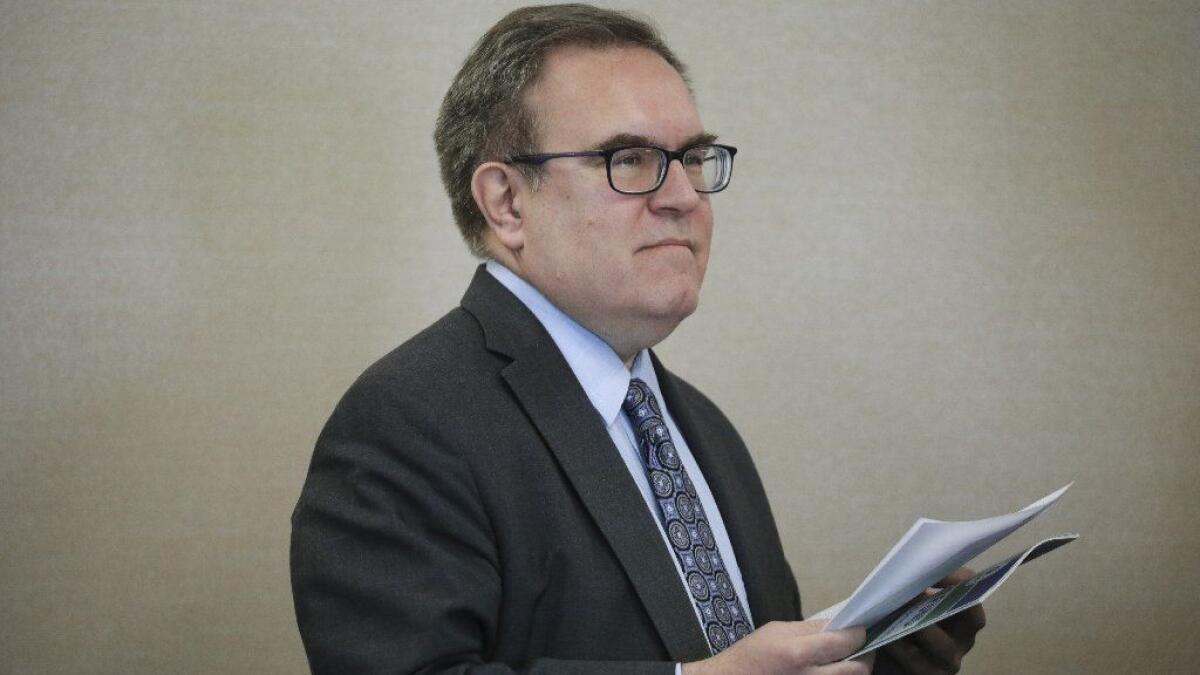EPA partially bans a toxic paint stripper but leaves workers exposed

- Share via
Reporting from Washington — The Environmental Protection Agency announced a partial ban Friday on a toxic chemical used to remove paint and varnish, angering groups that have advocated for a complete prohibition of a substance that’s been linked to dozens of deaths.
Once the rule takes effect later this year, consumers will no longer be able to buy paint removers containing the chemical methylene chloride. Anyone scanning the shelves of major retailers such as Lowe’s and Ace Hardware will discover that it’s probably already gone — many brands committed to phasing it out months ago.
But in a news briefing Friday, EPA Assistant Administrator for Chemical Safety Alexandra Dunn said the chemical will still be available for commercial uses. The agency is considering creating a “federally enforceable training program” for workers who use products containing methylene chloride.
“This chemical has been used in the workplace for some time,” Dunn said. “Yes, there have been fatalities, and we are very concerned about those. But that is why today we are looking at receiving input in 60 days about whether it’s possible to have a training program, federally proscribed, that would manage the use of this product in a commercial setting.”
Dunn left open the possibility that the chemical may be disallowed in the future, if the risks can’t be managed.
The agency’s announcement is another step in the Trump administration’s effort to roll back or significantly weaken Obama-era environmental and public health initiatives.
In the final days of the Obama administration, agency officials determined that methylene chloride and a similar solvent known as NMP represented “unreasonable risks” to the public’s health. They proposed an across-the-board ban on both of them for use as paint strippers. But under Trump, the EPA chose not to go forward with that prohibition.
The EPA’s announcement Friday drew sharp criticism from environmental and public health groups, as well as family members of victims who died of exposure to the chemical. These groups had advocated for protections for both consumers and commercial users.
“We will not allow this administration to once again attack our community, because that is what this rule does. It leaves workers blatantly exposed to deadly chemicals,” Hector Sanchez Barba, executive director of the Labor Council for Latin American Advancement, said in a statement.
“Latino and immigrant workers are overly represented in jobs that require exposure to deadly working conditions, including paint strippers,” he said. “Methylene chloride must be fully banned.”
According to the EPA’s own findings, exposure to methylene chloride fumes can quickly lead to dizziness and loss of consciousness.
Contractors and other commercial users account for many of the deaths linked to the chemical’s toxic fumes. According to the Occupational Safety and Health Administration, from 2000 to 2015, 17 workers died while using paint stripper products containing the chemical.
In 2015, a paint company based in Fullerton, Calif., agreed to pay nearly $1 million a to settle a lawsuit stemming from the death of an employee, Roberto Ramirez Magdariaga, who had been exposed to the chemical. Prosecutors said Magdariaga and another employee had been handling the paint stripper without the proper training or safety protocols. The other employee survived but sustained serious injuries.
Sen. Tom Udall (D-N.M.) issued a statement accusing the Trump administration of failing to follow the updated Toxic Substances Control Act that Congress passed in 2016.
“In that law, we explicitly authorized EPA’s work to ban methylene chloride-based paint strippers because of their dangerous effects on both workers and the public,” Udall said. “EPA’s action today is a watered-down protection that apparently values industry profits at the expense of public health and safety — particularly for the hardworking people who will still be risking their lives with exposure to these deadly products.”
More stories from Anna M. Phillips »
More to Read
Get the L.A. Times Politics newsletter
Deeply reported insights into legislation, politics and policy from Sacramento, Washington and beyond. In your inbox twice per week.
You may occasionally receive promotional content from the Los Angeles Times.











